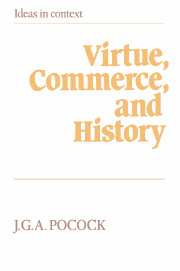 Virtue, Commerce, and History
Virtue, Commerce, and History Published online by Cambridge University Press: 05 May 2010
There are, perhaps, in the end only two ways in which a historian may undertake the study of a document in the history of political thought. One may consider it as a text, supposed to have been intended by its author and understood by its reader with the maximum coherence and unity possible; the historian's aim now becomes the reconstitution of the fullest possible interpretation available to intelligent readers at the relevant time. Alternatively, one may consider it as a tissue of statements, organized by its writer into a single document, but accessible and intelligible whether or not they have been harmonized into a single structure of meaning. The historian's aim is now the recovery of these statements, the establishment of the patterns of speech and thought forming the various contexts in which they become intelligible, and the pursuit of any changes in the normal employment of these patterns which may have occurred in consequence of the statements being made.
Both approaches have their advantages and disadvantages. It is the second which will be attempted, in this essay, to Burke's Reflections on the Revolution in France and subsequently to his Letters on a Regicide Peace.
To save this book to your Kindle, first ensure [email protected] is added to your Approved Personal Document E-mail List under your Personal Document Settings on the Manage Your Content and Devices page of your Amazon account. Then enter the ‘name’ part of your Kindle email address below. Find out more about saving to your Kindle.
Note you can select to save to either the @free.kindle.com or @kindle.com variations. ‘@free.kindle.com’ emails are free but can only be saved to your device when it is connected to wi-fi. ‘@kindle.com’ emails can be delivered even when you are not connected to wi-fi, but note that service fees apply.
Find out more about the Kindle Personal Document Service.
To save content items to your account, please confirm that you agree to abide by our usage policies. If this is the first time you use this feature, you will be asked to authorise Cambridge Core to connect with your account. Find out more about saving content to Dropbox.
To save content items to your account, please confirm that you agree to abide by our usage policies. If this is the first time you use this feature, you will be asked to authorise Cambridge Core to connect with your account. Find out more about saving content to Google Drive.